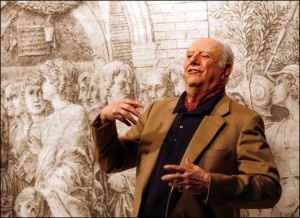A Message from Dario Fo
A Message from Dario Fò
(This message was written on behalf of Worldwide Commedia day)
I reprint it here by permission as one of the official events of that day!
It is a well-known fact that by the end of the 16th century the intensified repression of the Counter Reformation gave rise to a virtual diaspora of Italian theatre companies, forcing hundreds of actors and their families to relocate all over Europe, including into Germany, France, and England. A renowned English researcher, Professor Christopher Cairns states: “Without the encounters with Italian actors, Elizabethan theater— including the works of Shakespeare—would have never been born.†Therefore we shouldn’t marvel that in King Lear the Fool tells the deposed king: “Thou shouldst not have been old till thou hadst been wise.†This is a wonderful concept, taken directly from a line by Ruzzante, father of comic acting, in his play, Betia.
Many have found it paradoxical that expressions and concepts derived from the Humanist movement in Italy made their way to England by the end of the same century. Instead this cultural transit is not improbable in the least but has been more than documented by a particular event.
Let me explain.
One must remember that it was during Ruzzante’s time that a virtual revolution exploded in Germany, Martin Luther’s famous Reformation: a heretical movement that swept through Europe, striking Italy with such incredible violence that the Roman Catholic Church was at first too stunned to react. All of a sudden people almost expected to see the Pope hurled from his throne. In effect, a great climate of panic ensued. But, then, with firm resolve, the Church reacted and launched the Counter Reformation, conceived at the Council of Trent. It was the Church’s intention, first of all, to free itself from the notoriously unacceptable aspects of its management, as Martin Luther very justly denounced in his sermons, such as speculation on the sale of relics and the marketing of indulgences as well as blatant clerical corruption. At the same time, the Church desired to block unwaveringly the impetus of the innovators: to put a stop to the disputes and embarassments of the clerics.
The contrast of ideas—or, better, the conflict of ideas—was unacceptable, as was any kind of expression representing an obstacle to the Church’s Counter Reformation. The theatre, first and foremost, with its subversive energy and its ease in communicating new concepts to the lower classes, absolutely had to be squelched.
 About a hundred companies of Commedia dell’Arte actors were forced to flee their native land of Italy over the next quarter century, giving rise to an authentic artistic revolution in the world of theatre abroad. In this forced diaspora, the companies brought with them not only props and scenery but also the works of 15th-century Italian playwrights: Calmo, Folengo, Bibbiena, Ariosto, Machiavelli, Della Porta, and Aretino as well as nearly all of Ruzzante’s comedies.
About a hundred companies of Commedia dell’Arte actors were forced to flee their native land of Italy over the next quarter century, giving rise to an authentic artistic revolution in the world of theatre abroad. In this forced diaspora, the companies brought with them not only props and scenery but also the works of 15th-century Italian playwrights: Calmo, Folengo, Bibbiena, Ariosto, Machiavelli, Della Porta, and Aretino as well as nearly all of Ruzzante’s comedies.
At least one hundred or more of the original companies from Naples, Rome, Venice, Florence, and other important Italian cities left for France, England, Spain, Germany, and even Eastern Europe, including Russia.
Their arrival in the town squares around Europe was met with incredible enthusiasm from those new audiences. Intellectuals, the ruling class, the bourgeoisie, and even the lower classes took to these performances with great zeal. It is truly amazing to realize that, following the theatre troupes’ exodus, architects, scientists, merchants, and navigators also began to abandon Italy in turn. Thus, the most important philosophical movement, from which Humanism and the Renaissance had developed, spread from Italy to the most vital cities of Europe, leaving a great void in its wake.
As Giambattista Vico, noted philosopher and father of the New Science, said: Both positive and disastrous moments in the history of mankind repeat themselves in cycles so that often a person may, at one moment, appear extraordinarily serious and important and may suddenly, at another, become a tragic scoundrel. Yes, we are alluding to Italy’s perennial economic and moral crises, not to mention its political ones!
++++
_________________________________________________
For more information and to see photos, videos, and updates from “Commedia dell’Arte Day†events around the globe, visit the following websites:
http://www.commediadellarteday.eu
http://www.incommedia.it
http://www.factionoffools.org
And because I believe this shows off some excellent commedia– here is an excellent version of his performance “The Hunger of Zanni”– in which Zanni becomes so hungry that he eats himself.

